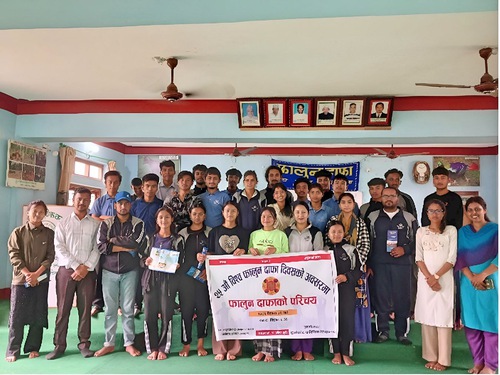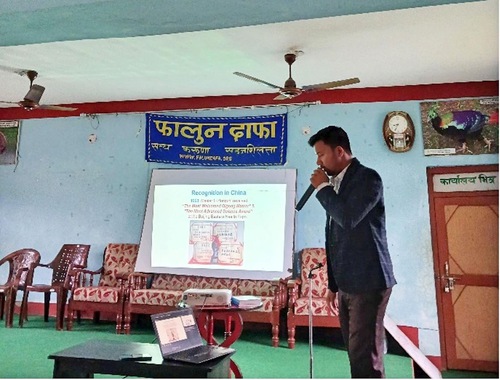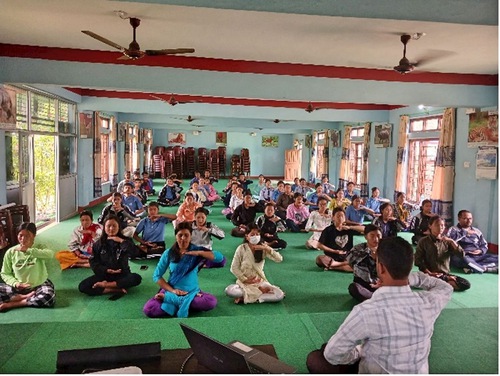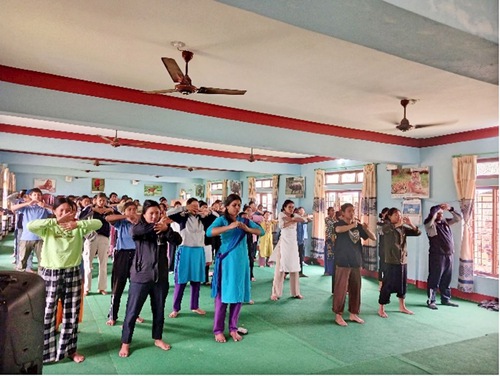(Minghui.org) To mark the 32nd anniversary of Falun Dafa’s public introduction, practitioners in Nepal held an introductory seminar at the Hupsekot Technical School on May 13, 2024. Over the course of the two-hour seminar, participants learned the history of the spiritual practice as well as the five exercises.
Many of the participants were amazed by the calming energy of the exercises, and were saddened to learn that such a beneficial practice was being persecuted in the country of its origin, China.

Teachers and Students Learn the Exercises
Dr. Prabin Puri introduced Falun Dafa, explaining that is a spiritual cultivation with five sets of meditative exercises and teachings on how to improve one’s moral character by striving to live by the principles of Truthfulness, Compassion, and Forbearance.

Due to Nepal’s close ties to Buddhism as the birthplace of Buddha Shakyamuni, many Nepalese were familiar with the concept that spiritual practices involve quiet meditation and can help people reach a better inner state. Many attendees said that they had learned different meditation disciplines before.
What was different about Falun Dafa to the attendees, however, was that they felt a greater sense of calmness in their minds throughout the seminar, and especially when they meditated.
One student asked if he could have the audio files of the music played during the Falun Dafa exercises, and was pleased when Dr. Puri gave him the link to the Falun Dafa website where he could download them for free.
In his introduction, Dr. Puri also explained that the Chinese Communist Party (CCP) has been persecuting Falun Dafa practitioners in China for over 24 years. This was surprising information to many participants, because Nepal shares an entire border with China, meaning that censorship by the CCP has kept the truth from Nepal.
When the participants were shown pictures of the torture methods used by the CCP against practitioners in China, many participants expressed their sympathy for practitioners and felt that the torture methods were too brutal to even look at.

Background: What Is Falun Dafa and Why Is the CCP Persecuting It?
Falun Dafa (also known as Falun Gong) was first introduced to the public by Mr. Li Hongzhi in Changchun, China, in 1992. The spiritual discipline is now practiced in over 100 countries and regions worldwide. Its teachings are based on the principles of Truthfulness, Compassion, and Forbearance. Millions of people who have embraced the teachings and exercises have experienced improved health and well-being.
Jiang Zemin, former head of the Chinese Communist Party (CCP), perceived the spiritual discipline’s growing popularity as a threat to the CCP’s atheistic ideology. On July 20, 1999, he issued an order to eradicate the practice.
Under Jiang’s personal direction, the CCP established the 610 Office, an extralegal security organisation that has the power to override the police and judicial systems. Its sole function is to carry out the persecution of Falun Dafa.
Minghui.org has confirmed the deaths of thousands of practitioners as a result of the persecution over the past 24 years. However, the actual number is believed to be much higher, due to the difficulty in getting information out of China. Countless practitioners have been imprisoned and tortured for their faith.
There is concrete evidence that the CCP sanctions the harvesting of organs from detained practitioners, who are murdered to supply China’s organ transplant industry.
Copyright © 2024 Minghui.org. All rights reserved.



